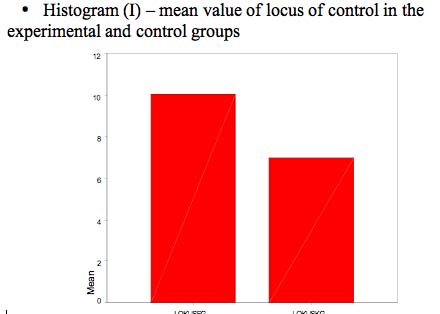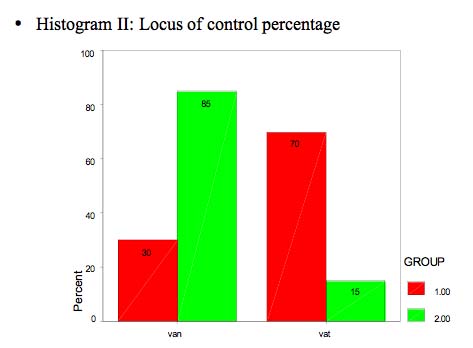Locus of Control in Adults Who Stutter
 |
About the presenter: Orlin Baev, is from Sofia, Bulgaria, where he is finishing a degree in Clinical Psychology. He is 35 years old, was a sailor formerly worked in agriculture and in a pastry shop. His future plans are to be a specialist of Integral and Transpersonal Psychology. He is interested in Integral Science, yoga, esoteric science and hopes to be a therapist working with persons who stutter. He is a member of the Bulgarian Stuttering Association. |
Locus of Control in Adult Stutterers
by Orlin Baev
from Bulgaria
Note: This document contains only extractions from the original research. The original experiment is in the Bulgarian language.
Locus of control
Locus of control theory is a psychological/sociological concept related to where individuals conceptually place responsibility, choice, and control for events in their lives. It distinguishes between two common approaches, which place the actual control either internal or external to the person. This decision, which is often unconscious, strongly influences motivation and a sense of self direction and psychological integrity on the one hand (if seen as something within the control of the person), and supports notions of helplessness, blame, and lack of psychological potency on the other (if seen as something held by others or by some outside agency).
Locus of control personality orientations
In terms of personality types, the concept distinguishes internals, who attribute events to their own control, and externals, who attribute events in their life to external circumstances. For example, college students with a strong internal locus of control may believe that their grades were achieved through their own abilities and efforts, whereas those with a strong external locus of control may believe that their grades are the result of good or bad luck, and are hence less likely to work hard for high grades. (It should not be thought however, that internality is linked exclusively with attribution to effort and externality with attribution to luck. This has obvious implications for differences between internals and externals in terms of their achievement motivation. Due to their locating control outside themselves, externals tend to feel they have less control over their fate. People with an external locus of control tend to be more stressed and prone to clinical depression (Benassi, Sweeney & Dafour, 1988; cited in Maltby, Day & Macaskill, 2007).
Characteristics
Internals were believed by Rotter (1966) to exhibit two essential characteristics - high achievement motivation and low outer-directedness. This was the basis of the locus of control scale proposed by Rotter in 1966, although this was actually based on Rotter's belief that locus of control is a unidimensional construct. Since 1970, Rotter's assumption of unidimensionality has been challenged, with Levenson, for example, arguing that different dimensions of locus of control, such as belief that events in one's life are self-determined, are organized by powerful others and are chance-based, must be separated. Weiner's early work in the 1970s, suggested that we should also consider differences between those who attribute to stable causes, and those who attribute to unstable causes. This meant that attributions could be to ability (an internal, stable cause), effort (an internal unstable cause), task difficulty (an external stable cause) or luck (an external, unstable cause). Such at least was how the early Weiner saw these four causes, although he has been challenged as to whether people do see luck, for example, as an external cause, whether ability is always perceived as stable and whether effort is always seen as changing.
Characteristics of locus of control orientations
Empirical research findings have implied the following differences between internals and externals:
- Internals are more likely to work for achievements, to tolerate delays in rewards and to plan for long-term goals, whereas externals are more likely to lower their goals.
- After failing a task, internals re-evaluate future performances and lower their expectations of success, whereas externals may raise their expectations.
- Rotter (1966) believed that internals tend to be higher in achievement motivation than externals). However, empirical findings have been ambiguous here.
- There is some evidence that sex-based differences may complicate these findings, with females being more responsive to failures, males to successes.
- Bialer's (1961), considerable data suggest that internal locus of control is associated with increased ability to delay gratification. However, at least one study has found this effect does not apply to all samples.
- Walls and Miller (cited in Lefcourt, 1976) found an association between internal locus and delay of gratification in second and third grade children, but not in adults who were vocational rehabilitation clients.
- Internals are better able to resist coercion.
- Internals are better at tolerating ambiguous situations.
- There is also a lot of evidence in clinical research that internality correlates negatively with anxiety, and that internals may be less prone to depression than externals, as well as being less prone to learned helplessness.
- However, this does not mean that the emotional life of the internal is always more positive than that of the external, as internals are known to be more guilt-prone than externals.
- Internals are less willing to take risks, to work on self-improvement and to better themselves through remedial work than externals
- Internals derive greater benefits from social supports.
- Internals make better mental health recovery in the long-term adjustment to physical disability.
- Internals are more likely to prefer games based on skill, while externals prefer games based on chance or luck.
Familial origins
The development of locus of control is associated with family style and resources, cultural stability and experiences with effort leading to reward.
- Findings from early studies on the familial origins of locus of control were summarised by Lefcourt: "Warmth, supportiveness and parental encouragement seem to be essential for development of an internal locus".
- Many internals have grown up with families that modeled typical internal beliefs. These families emphasized effort, education, responsibility and thinking. Parents typically gave their children rewards they had promised them.
- In contrast, externals are typically associated with lower socioeconomic status, because poor people have less control over their lives.
- Societies experiencing social unrest increase the expectancy of being out-of-control, so people in such societies become more external.
- The research of Schneewind (1995; cited in Schultz & Schultz, 2005) suggests that "children in large single parent families headed by women are more likely to develop an external locus of control" (Schultz & Schultz,2005, p439).
- Schultz and Schultz also point out that children who develop an internal locus tend to come from families where parents have been supportive and consistent in discipline.
- There has been some ambiguity about whether parental locus of control influences a children's locus of control, although at least one study has found that children are more likely to attribute their successes and failures to unknown causes if their parents had an external locus of control.
- As children grow older, they gain skills that give them more control over their environment. In support of this, psychological research has found that older children have more internal locus of control than younger children.
Summary, critique and the future
Locus of control has been a concept which has generated much research in psychology, in a variety of areas. Usefulness of the construct can be seen in its applicability to fields such as educational psychology, health psychology or clinical psychology. Careful distinctions should also be made between locus of control (a concept linked with expectancies about the future) and attributional style (a concept linked with explanations for past outcomes), or between locus of control and concepts such as self-efficacy. The importance of locus of control as a topic in psychology is likely to remain quite central for many years.
Locus of control and the attributive style
The attributive style is a concept, introduced by (Abramson, Seligman, Teasdale, 1978/32 /). Two attributive styles are specified: positive and negative, the positive is related with the optimism and the negative with the pessimism.
- A positive attributive style is connected with the optimism. Optimists explain the events in their life positively. The optimists explain that the positive events in life as happening due to their efforts (internal localization of control). They also see the positive events in their life as proof that they will continue to happen to them in the future and in other spheres of their life as well.
- A negative attributive style is connected with the pessimism. The pessimists believe that the negative events are caused by themselves (internal localization of control), they believe that one mistake leads to more mistakes and failures in other areas as well. They see the positive events in their life as accidents out of their control that will probably never happen to them again (external locus of control).
Which type of localization is more desirable?
In the psychological circles is commonly assumed that the internal locus of control is more desirable. The internal locus of control can be defined as internal discipline, self - control, self-confidence and ambition. The researches have measured the following facts :
- Men as a whole are more frequently internals than women.
- With the aging the tendency for internal locus of control amplifies.
- People on higher posts in the organizational structures, have stronger internal locus of control (Mamlin, Harris and case, in 2001/28/)
The desirability of the internal locus of control should not be exaggerated though. People with external locus of control often live happy and carefree lives. Internals can be mentally unstable and neurotic, when the objective outward circumstances prevent their ambition and need for achievement. The internal localization of control must be convoyed by adequate competence, a personal effectiveness and intelligence, in order to be able to apply one's control and responsibility in real situations. People with dominant internal localization of control who lack the suitable capacity, cognitive and emotional intelligence, effectiveness, as well as objective opportunities, become neurotic, anxious and depressed. In other words, internals need to have a realistic vision for their actual potential in order to realize their need of achievements.
Despite the above mentioned reasonings, psychological surveys have found that the individuals with more internal locus of control statistically are more successful, achieve more, take better and higher job and social positions, receive more social and material benefits and are mentally more integrated and healthy.
The Experiment
Goal of the experiment: The goal of the experiment was to determine the locus of control in people who stutter.
Hypothesis of the exploration: Stutterers will have statistically significant more external localization of control in comparison with fluent speakers
Variables
- Dependent variable - locus of control of adults who stutter
- Independent variables - presence of stuttering; speech fluency
Experimental procedure
The experimental group (EG), was comprised of 20 persons diagnosed by a speech therapist as persons who stutter and the control group (CG) was comprised of 20 fluent speakers.
The examined persons ranged from 21 to 63 years of age. The number of males in each group was equal since stuttering occurs primarily in males.
Method for data collection - The adapted for Bulgarian conditions questionnaire on locus of control, based on the original questionnaire of Rotter (1966)
Results and analyses of the data

Analysis: The range of individual values of locus of control of the experimental group was from 5-15, and from 3-13 in the control group. The experimental group shows the tendency in stutterers for external locus of control. As we can see in the histogram above, the mean value in the experimental group is 10 and the mean value is 7 in the control group showing differences in the locus of control between stutterers and fluent speakers, at least within the frame of the two groups studied. The mean value of 7 demonstrates that the persons in the control group are more likely to think that the results in their life are fruit of their own efforts and control. The mean value of 10 for persons in the experimental group demonstrates that this group is more likely to relate their success or failures in life to chance, permitting external circumstances to create their motivation, understandings and aims.

Analysis: as is demonstrated in a the above histogram (II), 70 percent of the control group demonstrates internal locus and 30 percent external locus. In the experimental group 85 percent demonstrate external locus of control and 15 percent internal. The difference is significant. In fact the results perplex even this investigator. External locus is clearly is demonstrated in the personality, the character and the social realization of the majority of stuttering persons participating in this experiment.
The final check was made with the test of Levene. People with stuttering have significantly more external locus of control (M = 10) in comparison with the fluent speakers (M = 7). In other words, the survey attests the validity of the promoted hypothesis. Stuttering hampers the pace of free speech of the non-fluent speaker. It is possible that motivation for achievement, ambition, need for skills and independence of non verbal outward circumstances in stutterers are great, but the lack of possibility for adequate verbal social functioning which blocks these qualities, creates a false image of external localization of the control.
Conclusion
This study confirms the promoted hypothesis - stutterers have prevailingly external locus of control.
Internal locus of control is a contemporary expression of qualities that have always been familiar to the world: emotional confidence, cognitive and behavioral autonomy, presence of mental strength and clear self-awareness, healthy ambition and motivation for achievement.
According to the present research, stutterers have predominantly external locus of control. Whether this is a result, determined only from the speech of stutterers or is a consequence of deeper, purely psychological causes is controversial. Whatever the truth is, facts speak for themselves. Stutterers are more likely to have external locus of control. The external locus in stutterers is a useful statistic. Transferred in the daily life of people who stutter, it represents actual cognitive construct, stable disposition that predetermines the life of many who stutterer in passive passage through the life cycle.
Bibliography
32) Abramson, L. Y., Seligman, M. E. P., & Teasdale, J. D. (1978). Learned helplessness in humans
Benassi, Sweeney & Dafour, 1988; cited in Maltby, Day & Macaskill, 2007. Personality, Individual Differences & Intelligence
Bialer (1961)
Lefcourt, H. M. (1976). Locus of control: Current trends in theory and research (2nd ed.). Hillsdale, NJ: Lawrence Erlbaum Associates.
Mamlin, N., Harris, K. R., Case, L. P. (2001). A Methodological Analysis of Research on Locus of Control and Learning Disabilities: Rethinking a Common Assumption. Journal of Special Education, Winter.
Rotter, J. B. (1966). Generalized expectancies for internal versus external control of reinforcement. Psychological Monographs, 80
Schneewind (1995; cited in Schultz & Schultz, 2005)
Walls and Miller; cited in Lefcourt, H. M. (1976). Locus of control: Current trends in theory and research (2nd ed.). Hillsdale, NJ: Lawrence Erlbaum Associates.
Weiner, Bernard, Attribution Theory, Achievement Motivation, and the Educational Process
September 1, 2007

